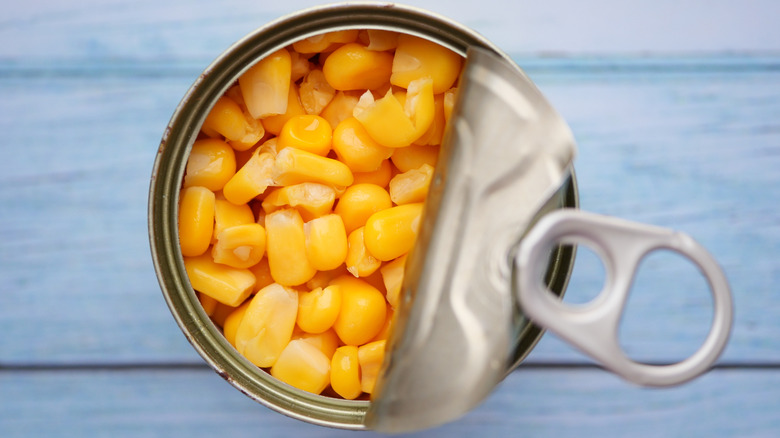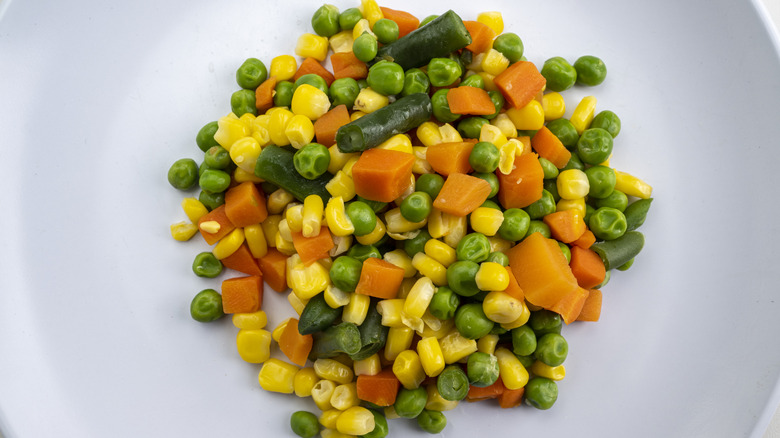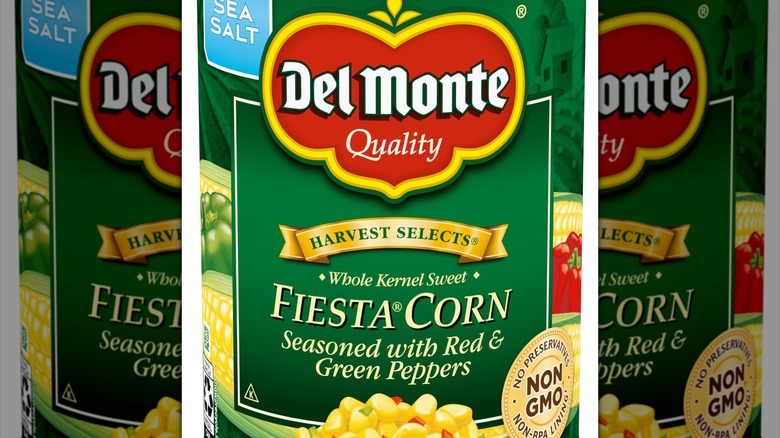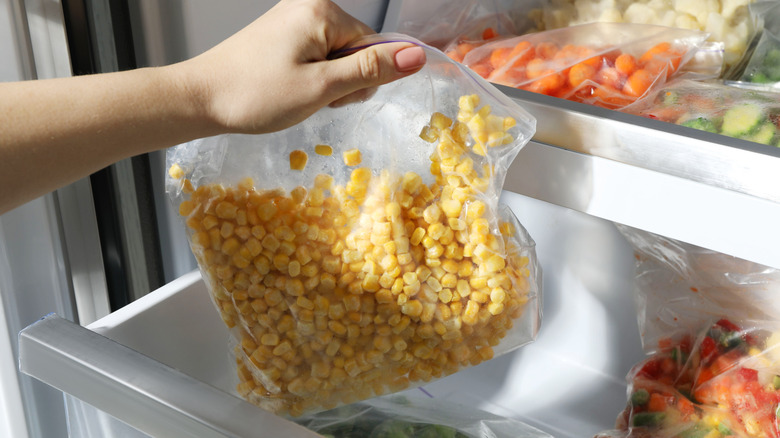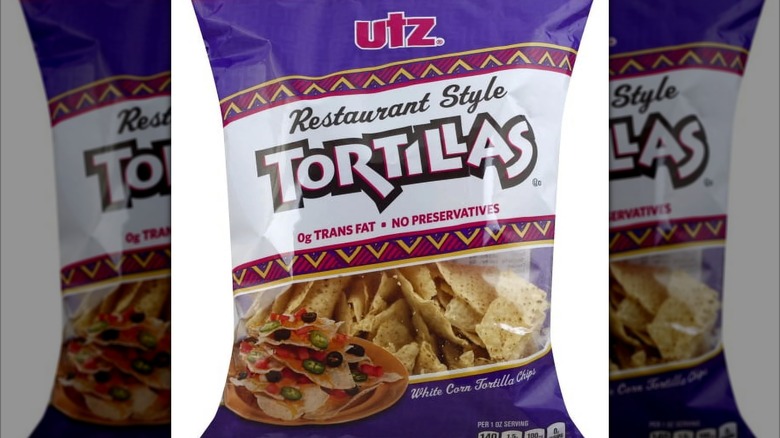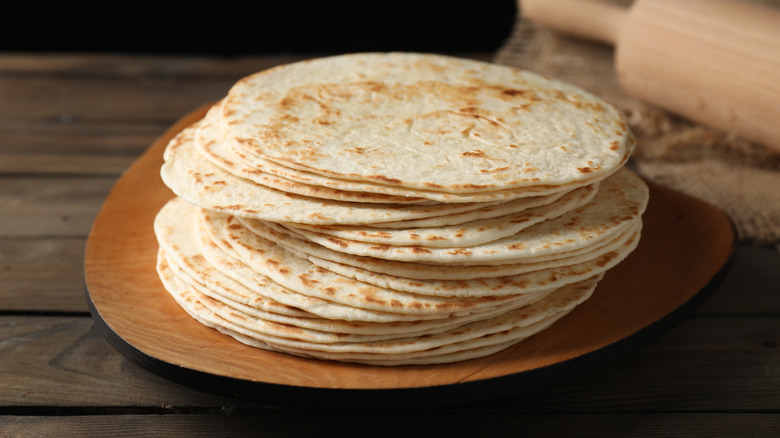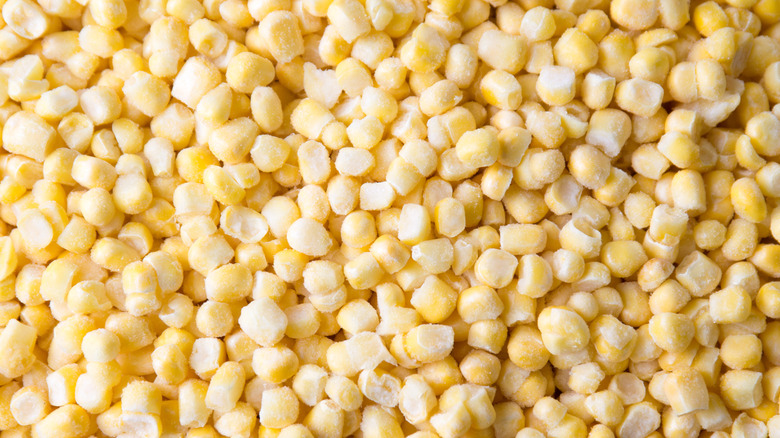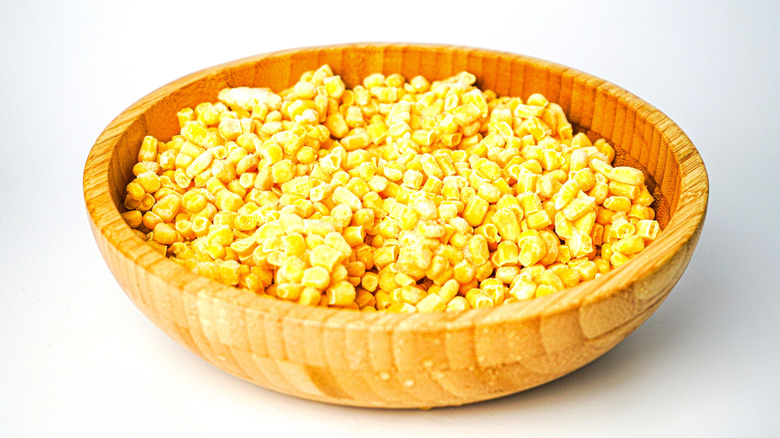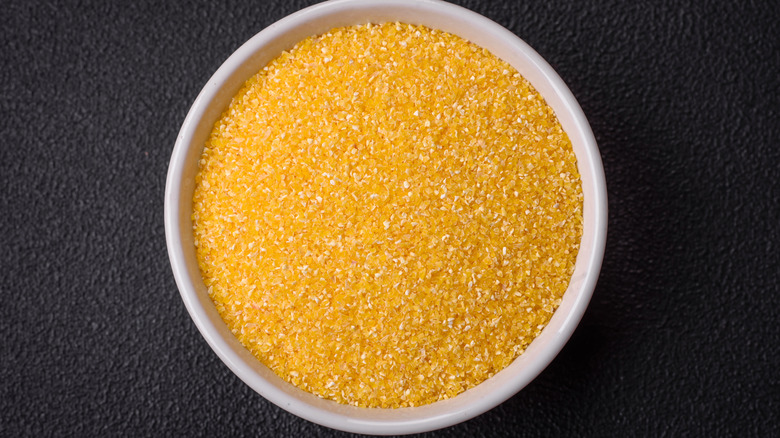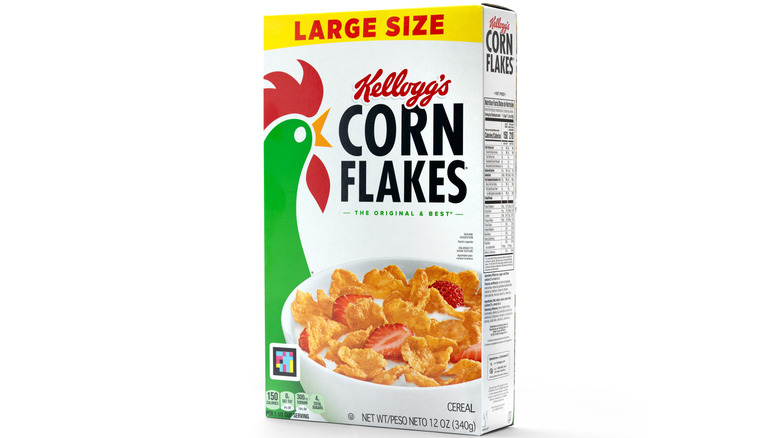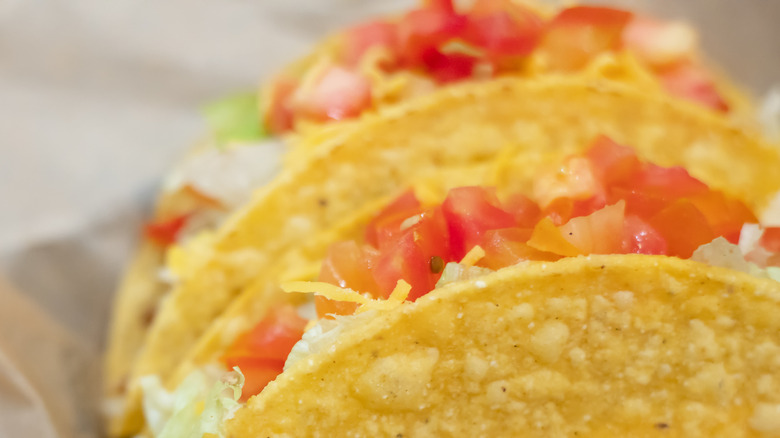Corn Recalls That Affected Millions
We may receive a commission on purchases made from links.
Historically one of the most farmed, consumed, and versatile cash crops in the Americas, corn has earned its place in the center of the United States' economy and diet. Corn looks so much different than it used to, owing to generations of cultivation, crossing breeds, manufacturing, and manipulation, but that's only made it more important and dominant. Whether it's corn on the cob, frozen corn kernels by themselves or mixed with other vegetables, cans of corn, or corn mashed and pressed into chips, flakes, or batter, there's no doubt that Americans eat a lot of corn.
Such a large and sophisticated industry involves a lot of labor and a lot of handling, and that creates plenty of opportunity for disaster to enter into the equation. Corn crops and corn-based products can quite easily be affected by food-borne pathogens, fungus, mold, foreign objects, and other alarming things. That necessitates the occasional — but far-reaching — recall of tainted or potentially tainted product. Here are the biggest recalls in American history that, in one way or another, involved corn.
Listeria concerns triggered a store-brand corn recall (2023)
Supermarket chains sell hundreds or even thousands of products under a private label, or store brand. Essentially generics, these foods often bear the name of the store itself and are sold at lower prices than that of the leading name brands. The grocery chains contract with massive industrial food suppliers to process and package those goods, and they have many clients. Twin City Foods, for example, makes bags of frozen sweet corn and corn-centric mixed vegetable medleys for Food Lion, Kroger, and other stores. It's all the same corn in this instance — and so when a quantity was recalled in August 2023, it had to be pulled from many different supermarket entities.
Washington-state based Twin City Foods asked for customers to not eat but instead to return bags of mixed vegetables due to the possibility of contamination by Listeria monocytogenes, the pathogen that causes the form of food poisoning called listeriosis. Infection presents as headache, fever, and gastrointestinal symptoms, but it can potentially be deadly in the very young, very old, and immune-compromised.
The recall included 22 different lots of product vegetables sold by three grocery chains. Super Sweet Cut Yellow Corn and Mixed Vegetables with Corn were targeted, all bearing Food Lion, Kroger, or Signature Select (Albertson's) branding, with expiration dates that stretched into 2025.
Tons of corn dog batter went back because of metal bits (2021)
A Midwestern state fair classic with Pacific Northwest roots, the corn dog is the result of a hot dog on a stick enjoying a dunk in wet, raw cornmeal batter before it's deep-fried to golden-brown perfection. A staple of snack bars, fast food outlets, and outdoor gatherings, many otherwise anonymous gigantic food service companies make sure those corn-dredged hot dogs are ready to cook by preparing them at central, industrialized locations. Newly Weds Foods is one such corn dog creator, and in 2021, it faced a massive recall when an inedible and possibly dangerous ingredient was discovered in some of its products: metal.
In November 2021, Newly Weds Foods recalled five lots, or more than 5,100 bags of corn dogs in its 50-pound size, along with 50 containers of 50-pound scampi seasoning quantities. The problem stemmed from facilities in Arizona and Oklahoma that allowed fragments of metal to seep into the batter (and scampi seasoning) that Newly Weds Foods used on those corn dogs. A total of 259,050 pounds of the festive fair food was subject to recall.
Del Monte recalled canned corn over botulism fears (2018)
A leading producer of canned, packaged, and preserved fruit and vegetables, Del Monte is responsible for one of the top 12 canned corn brands on the market. Corn is certainly where Del Monte puts a lot of its pride, regularly canning and distributing more than a dozen varieties of corn niblets in metal containers, most of it sweet and whole kernel. One of those offshoot styles is what's now billed as Harvest Selects Whole Kernel Sweet Fiesta Corn. It consists of corn pieces with a mildly spicy kick provided by little bits of red and green peppers.
In December 2018, Del Monte had little choice but to issue a rapid and widespread recall of Fiesta corn over serious health concerns. Nine lots of the 15.25-ounce codes were asked back by Del Monte, which had distributed them to 25 states and into Central America, South America, and the Caribbean — a volume of 64,242 cases of product. The company was concerned that some cans may have been an ideal environment for the growth of botulinum toxin, the pathogen that can lead to botulism.
One of the most potent and dangerous forms of food poisoning, botulism can cause muscle issues, vision problems, breathing issues, and even death. Industrially canned food is usually protected against the botulinum toxin during the proper canning process; the recalled cans may have not been sufficiently processed to destroy it.
Pathogen-infected corn was central to one of the biggest recalls of all time (2018)
In October 2018, a disparate group of retailers that included Walmart, Trader Joe's, Whole Foods, and 7-Eleven, recalled 2,811 pounds of prepared salads. While those were produced by a variety of suppliers, including GHSE, Prime Deli Corporation, and Mary's Harvest Foods, they all had one thing in common. They contained potentially tainted corn obtained from the same place: McCain Foods USA, primarily a provider of vegetables both sold on their own and used as an ingredient by over 30 producers and suppliers.
Over six weeks in the fall of 2018, the USDA and FDA oversaw the beginnings of the recall of 146 McCain-linked products. Altogether, it affected 99 million pounds of food and took three years to complete. McCain ultimately decided to recall everything that even had so much as an ingredient that had been processed over a specific period of time at its plant in Colton, California. Frozen meals, burritos, soups, and sandwiches sold at grocery stores, convenience stores, and on airlines were impacted because of possible contamination from salmonella and listeria, two different and considerably dangerous forms of food poisoning-causing pathogens.
Throughout the recall, one of the most significant sectors was corn. More than 82,400 12-ounce bags of frozen Signature Select Mexican Style Roasted Corn from Safeway were ordered back, as were 617 cases of Zinetti Roasted Vegetable Blend, both distributed by McCain client Harvest Food Group.
Numerous Utz-made corn chips contained a potentially dangerous ingredient (2018)
Those big tubs of Utz Cheese Balls reign supreme, but the snack maker produces many other salty and crunchy items, under its own name and that of many subsidiaries, such as potato chips and corn-based tortilla chips. No matter the name prominently featured on the bag, all those corn and tortilla chips and all their various flavors and variations, are all made in the Utz facilities, and often at the same time. That can all be discerned due to a major recall Utz Quality Foods issued in May 2018.
The chip maker recalled nearly a dozen different styles across four different brands — Golden Flake, Good Health, Weis, and Utz. There wasn't anything outrageously dangerous in those loads of chips — a figure comprising more than 181,000 pounds and sent to 32 states in all — unless they were consumed by someone with an allergy or aversion to dairy products.
Dairy is among the most common food allergens, and it's a legal requirement for mood makers to list their use on the packaging of products that contain those ingredients. Utz's corn chips used a recipe that contained a small amount of milk, and that wasn't mentioned on the label, so they had to be recalled.
A huge quantity of masa contained metal (2016)
Masa is the dough used to make a number of traditional Mexican and Central American foods, including tamales and tortillas. It starts with raw corn masa dough, which is made from alkali-soaked and softened finely ground corn. One of the United States' major manufacturers of corn masa flour is Azteca Milling, which stocks markets with different brands, including Truco.
In September 2016, Azteca Milling and the Food and Drug Administration put out a recall of 849,533 total pounds of Truco corn masa flour, a large and necessary response to complaints it had received from consumers. Multiple reports had been filed over small pieces of metal turning up in the masa flour, and Azteca determined that the foreign material, potentially internally injurious if accidentally consumed, could be present in as many as 18 different lots of product. The recall of Truco 1 50/50 Corn Masa Flour remained in effect for nearly four years, called off by the FDA in August 2020, owing to masa's lengthy shelf life.
Listeria presence led ConAgra to recall 7 million pounds of corn as part of a huge recall (2016)
In April 2016, when testing samples of peas and corn made by CRF Frozen Foods of Pasco, Washington, the supplier for dozens of brands of frozen fruits and vegetables, the Ohio Department the Ohio Department of Agriculture discovered Listeria monocytogenes, which can cause the bacterial infection listeriosis, in some of its vegetables. An internal investigation indicated that the bacteria may have been present in foods made by CRF as early as May 2014.
With frozen produce tending to remain in customers' freezers indefinitely, and having no idea how long the listeria could have remained in its processing facilities, CRF recalled absolutely everything it made between May 2014 and April 2016. Spanning multiple individual recalls, 358 fruit and vegetable products under 42 separate brands were deemed dangerous. Stores and brands like Trader Joe's, Meijer, Schwans, O Organics, Safeway Kitchens, Walmart's Great Value, Costco's Kirkland Signature, Wild Oats, and Earth's Pride Organics all had to participate in the public safety action, recalling many vegetables, including organic sweet corn.
ConAgra Foods' organic peas, veggies, and corn was pulled in, too, and that firm alone asked consumers to not eat more than seven million pounds of packaged produce. Altogether, 164 million pounds of food was recalled; along the way nine people became sick and were hospitalized, with one death due to listeriosis.
Frozen corn was recalled across supermarkets (2015)
New York state-based frozen food maker Bonduelle packages vegetables under several different brand names. In September 2015, it recalled a large chunk of its recent corn production after product testing in Tennessee gave a positive result for the presence of small amounts of Listeria monocytogenes. That can lead to listeriosis, a food-borne illness characterized by headache, nausea, fever, cramps, and diarrhea, which can be more serious or even fatal for children, older adults, pregnant women, and those with compromised immunity.
The cut and frozen corn had been sent out for sale in 14 states throughout New England, the South, and the Midwest, and Bonduelle issued a recall, asking for consumers to discard 9,335 cases of the frozen vegetables. No illness reports were filed at the time of the recall, which included lines such as Wylwood Super Sweet Whole Kernel Corn, Market Basket Cut Corn, Bountiful Harvest Whole Kernel Cut Corn, and West Creek Frozen Vegetables Cut Corn.
Corn-based baking mixes were recalled due to the presence of toxic mold (2013)
Different crops are susceptible to different molds, and some not only affect the growth of the plant but can be toxic if still present after processing and unknowingly consumed by humans. Corn is particularly negatively impacted by aflatoxin, and it's so commonly found in small, harmless amounts that the Food and Drug Administration allows corn-based products to contain aflatoxin levels not exceeding 20 parts per billion.
If finished corn products are found to have made it to the market with a disagreeably high level of aflatoxin still present, they must be recalled. That was the situation faced by the J.M. Smucker Company in September 2013. Testing showed an unacceptable level of aflatoxin in various cornbread, grits, and cornmeal products sold under the Jim Dandy, Martha White, Gladiola, and White Lily brand names. Aflatoxin in samples spanned from 30 to 207 parts per billion, and so a recall ensued. J.M. Smucker ordered the return of more than half a million pounds of packaged mixes made from ground corn.
Overgrowth of fungus led to a cornmeal recall (2012)
There are well over 140,000 different kinds of fungus to be found in the natural world. While some fungi are tasty and healthy for humans to eat, others can lead to illness and food poisoning. Fumonisin is one of the bad types of fungus. It thrives particularly well in corn, and it can survive after the kernels have been cut, ground, processed, and made into shelf-stable cornmeal. The FDA classifies fumonisin as a pathogen and a toxin, meaning it can cause severe illness if eaten.
In April 2012, the FDA tested a run of cornmeal made by Haldeman Mills and detected the presence of fumonisin. The agency and the manufacturer determined that 25-pound bags of yellow cornmeal and 50-pound bags of roasted yellow cornmeal may have been sent to various wholesale and retail locations throughout Pennsylvania to be sold in bulk. A recall took place, with Haldeman Mills looking to seize 32,500 pounds of yellow cornmeal.
Corn Flakes were recalled due to a lack of corn (2004)
One of the largest cereal recalls ever involved corn, or rather the conspicuous absence of it. Kellogg's manufactures a number of cereals out of the same facilities, such as Corn Flakes, made from little more than corn, and Special K, whose flakes are made in part with wheat. In May 2004, a production line error resulted in 18-ounce, pre-printed Corn Flakes boxes getting packed with bags of Special K cereal.
About 85,050 pounds of cereal were mis-labeled without disclosing the presence of wheat or milk, and then sold throughout the Midwestern and western United States. Kellogg's hadn't heard any complaints or been made aware of any illnesses or allergic reactions that resulted from consumers unknowingly eating Special K in lieu of Corn Flakes. Still, a recall was necessary.
Wheat, which contains gluten, is one of the most common food allergens, and food makers are required to declare on packaging that the product inside contains such ingredients. Those who are allergic can avoid that food, but if the wrong thing is in that package, it counts as an undeclared allergen. Consumers who purchased wheat-free Corn Flakes and then ate the wheat-containing Special K inside, could have become very ill.
The first GMO corn was recalled because it hadn't been approved for consumption (2000)
Organic and non-GMO don't mean the same thing. The former is food whose ingredients were cultivated without the use of chemical pesticides, and the latter was made without food scientists altering the DNA of the innate crops to make them taste better and/or be more resistant to negative environmental factors like pests. After decades of research, the first GMOs, or genetically modified organisms, were approved by the FDA in the mid-1990s. Some of the first GMO crops deemed okay for human consumption included soybeans, summer squash, tomatoes, and some varieties of corn.
One style of corn, StarLink, had been altered to contain a protein called Cry9C that repelled insects and was also somewhat hard on the human digestive system. Somehow, StarLink corn had found its way into taco shells in 2000 made by Kraft for use at 7,000 Taco Bell outlets and for sale in supermarkets. StarLink hadn't yet received FDA approval when it was harvested, sold, processed, made into taco shells, and then sent to thousands of locations around the U.S. Kraft recalled as many technically illegal corn-made taco shells as it could.
